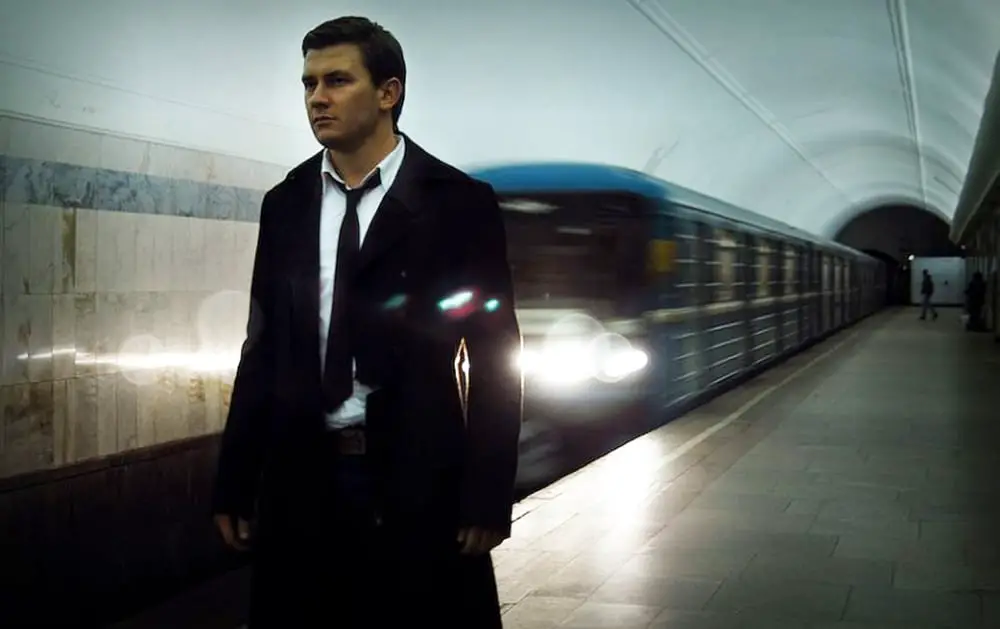In an interview with the French art blog Adria’s News, Dmitry Glukhovsky was asked why he continued to post his literature online, to which he bluntly replied: “I want my books to spread like a virus.” With over five million free downloads of his novels, in 37 different languages, as well as in print, not to mention the three-going-on-four video games, a board game, one upcoming movie, and a “universe” that has franchised to multiple authors that have built upon his work in dozens of other novels… it is suffice to say that his goal is not far from being achieved.
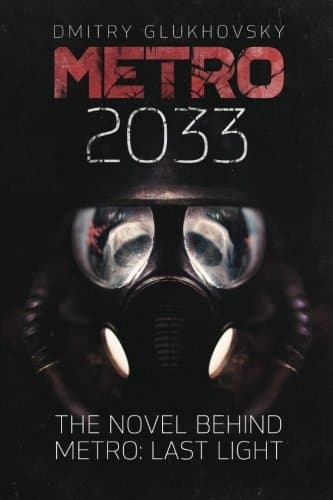
Dmitry Glukhovsky was born in 1979 in the Strogino District of Moscow. Since his birth, he was surrounded by critical thinkers as both of his parents graduated from Moscow State University with degrees in journalism. His father Alexei, a Jew by nationality, worked as an editor for Gosteleradio, an agency that ran television and radio programing in the USSR. His Russian mother Larisa worked as a photo editor for TASS, a major news agency still based in Moscow. In an interview with Russia’s Cosmopolitan magazine Glukhovsky stated that his parents inspired him to take up journalism. When he was younger he would often see his parents writing and followed suit by writing stories on his father’s typewriter. Writing and analyzing what was around him was ingrained in him by his parents from a young age.
Glukhovsky spent much of his childhood with his maternal grandparents, who owned their own home outside of Moscow. They dedicated themselves to his education and saw to it that he became an advanced reader at a young age. In his youth, Glukhovsky attended an elite French school in the Arbat District of Moscow. While studying he continued to use his creative abilities, as he was known to invent games and stories to entertain his classmates.
After the collapse of the Soviet Union, Glukhovsky attended the Hebrew University in Jerusalem, Israel. In a conversation with Adria’s News he stated his decision to leave Russia was twofold. Firstly, his father was Jewish and because of this he had some familiarity with Judaism. Secondly, Israel was a less expensive option than universities in the West for “an American quality education.” Similar to both of his parents, Glukhovsky graduated with a dual degree in journalism and international relations.
After graduation, Glukhovsky worked for EuroNews, a European news channel based in Lyon, France. In his time with the western news agency he became acquainted with liberal ideas and institutions. After three years, Glukhovsky felt he was “repeating” himself in his daily routine. In many interviews he has given as an author, the theme of repetition, and Glukovsky’s despisal of it, is a common theme. He craves experimentation and new experiences. Thus, he says, he left EuroNews.
In 2005, he returned to his homeland to work as a television correspondent for Russia Today as part of the “the Kremlin Pool,” a group of journalists that covered the activities of the Head of State. In his time with the station, Glukhovsky says he stopped believing that “power was sacred,” because of the discrepancy between how politicians were portrayed by the media and how they were in real life. For example, in the interview with Adria’s News Glukhovsky stated that Dmitry Medvedev is “reputed to be small” with a height of just 5′ 3″. However, there are strict rules on how he can be filmed by news stations so that he appears to be a more average height. According to Glukhovsky, the state-controlled media would rather construct a model politician rather than portray a human with flaws.
Glukhovsky gives an interview in English for the video game release of his Metro 2033.
Glukhovsky, with his language skills and obvious sense of adventure, was also chosen to join an expedition where he became the first person to report on live television from the North Pole. In another journalistic feat, on a trip to the Ukraine to cover the Chernobyl disaster, Glukhovsky left the ‘safe’ zone where press were allowed to report from and went into the Chernobyl Exclusion zone. Whilst in this zone, he interviewed families that returned to the isolated area after they were forcefully evacuated in 1986. His goal was to show Russians the reality of a city poisoned by radiation, an issue that pervades his seminal novel, Metro 2033.
Although Glukhovsky was a talented journalist, it was through the publication of Metro 2033, an original fiction, that he achieved fame. Glukhovsky conceived the idea of Metro 2033 in high school. Since he grew up in the outskirts of Moscow, each day he would ride the Metro, the name applied to Moscow’s subway system, to go to school and he became fascinated by its history. The Metro opened in 1935, in a time of rising world tension before World War II and, during the war, construction of the system was accelerated. Stations were constructed far beneath the ground and doubled in purpose as bomb shelters with self-sealing doors, a water supply, and air purification systems. Today, it is a widely-known secret that “Metro-2” also exists, a separate system that links the Kremlin with special bunkers for the government and military. Thus, in the event of catastrophic war, the subway system was intended to become an unground civilization for the people of Moscow.
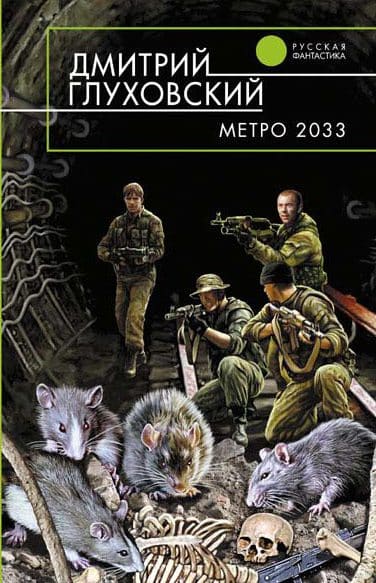
The plot of Glukhovsky’s novel begins in the aftermath of a nuclear war and is centered around a young man named Artyom, who has lived almost his entire life at the VDNKh station beneath what was once Moscow. The only survivors exist in the labyrinth of the Moscow Metro, approximately two decades after the war. It is Artyom’s job to protect the remaining humans from the creatures that lurk above.
In Glukhovsky’s first novel, the main threat to the survivors inhabiting the Metro is not starvation, but something psychological in nature. Metro 2033 is a dreary depiction of the physical and moral collapse of post-apocalyptic humanity. In his journey through the subway system, whose stations now have different cultures and governments, Artyom encounters cannibals, Stalinists, the Fourth Reich, a born-again Christian theocracy, and rebel Trotsky followers. Introducing these competing ideologies was a means through which Glukhovsky could critically analyze the repercussions of communism, and fascism, on modern day Russia.
Artyom’s reservation to commit to or engage in any of the ideologies he encounters works to emphasize Metro 2033’s bleak nihilism, an existential philosophy that has deep roots in Russian history. The relatively large Russian Nihilist Movement of the late 19th and early 20th centuries is often accused of having left the country open to communism by rejecting the Tsarist monarchy and the Orthodox Church. Similarly, after the collapse of the Soviet Union in 1991 (while Glukhovsky was still in school in Moscow), many were quick to reject the moral principals in which their life had been previously based as the economy and government both failed, and crime rates rose drastically as people sought any means to survive.
Another major influence for Glukhovsky’s Metro 2033 was Stanisław Lem, a renowned Polish science fiction author. Lem’s book Solaris is the inspiration behind the “Dark Ones” – the humanoid creatures that lurk in the destroyed landscape of what was once Moscow. In Lem’s novel, Solaris is a sentient planet that is content to co-exist with humans until a team of researchers use aggressive force to try to communicate with it. Similarly, the “Dark Ones” in Metro 2033, want to live symbiotically with the humans, but the humans misinterpret their existence and growing closeness as a threat. In both cases, humans do not have the capacity to communicate or understand those who are different and the acts of peace they attempt to offer. In both cases, the end is tragic.
Although his dark Metro 2033 manuscript was initially refused by publishers, Glukhovksy did not lose hope and instead decided to self-publish in 2002, shortly after graduating college. He created a website specifically for the work and, from its online posting, the novel went viral. Metro 2033 is now also in print and one of the best-selling contemporary Russian novels, with its circulation exceeding one million copies and another four million readers online. Critics, like readers, were impressed with Glukhovsky’s novel. His philosophical analysis paired with his creation of a realistic world was praised. Recently, the adaptation rights were purchased by the Hollywood film studio Metro-Goldwyn-Mayer.
A video game by the same name, Moscow 2033, was released in 2010 and was developed by the Ukrainian company 4A Games and published by THQ, an American company. The game is single player and is principally set in the Moscow Metro and Metro-2 system, with some sections set in the ruins of Moscow. The lack of explanation of what caused the devastation serves to underscore the game’s nihilistic philosophy. The player has nothing to live for, no beliefs, and no ties to the world around them; their only goal is to stay alive.
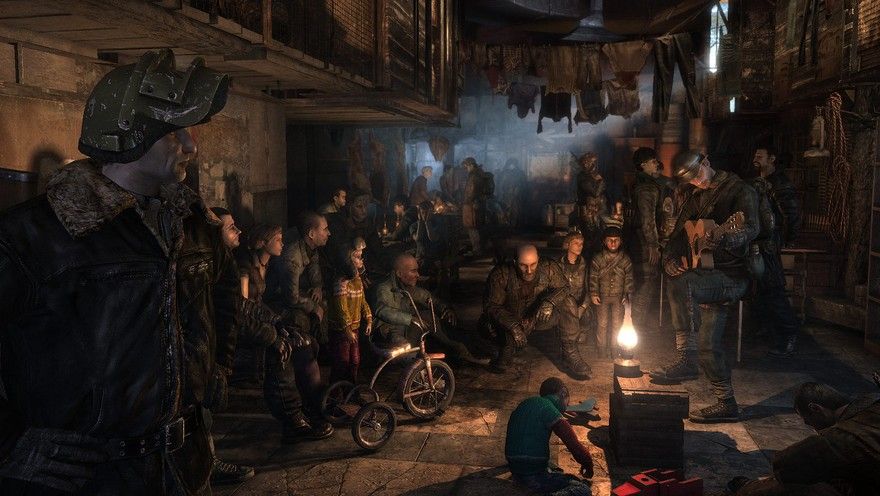
The success of Metro 2033 enabled Glukhovsky to create original fiction while also continuing the Metro series. In 2007, for example, Glukhovsky wrote Dusk as an online experiment. He posted the novel on his website, chapter by chapter. Although the novel was a departure from his last publication, the book sold slightly over one hundred thousand copies and was downloaded by over half a million readers. This novel deviates from Metro 2033 in that it begins with a more recognizable reality: a translator named Dmitry is asked to translate several pages from a Spanish journal dating back to the 16th century. As Dmitry becomes obsessed with the journal, Glukhovsky explores magical realism. The lines between reality and fiction suddenly become blurred as eerie incidents begin to take place – earthquakes in Iran, hurricanes in the United States, tsunamis in Indonesia, as well as droughts and fires in Russia. Soon the translator realizes there is a parallel between the lost civilization of the Mayans’ to the modern world. With the translator’s discovery of an impending apocalypse, the novel delves into heavy concepts such as the finitude of life and the world. Despite the dark topics, the novel also offers hope, as people’s continued faith and desire to live proves humans are willing to fight to survive. Critics largely welcomed his experimentation, deeming it a perfect combination of philosophical concepts and magical realism with an original narrative.
In 2010, Glukhovsky shifted more towards satire with his two-volume Stories About the Motherland, a collection of stories that depicts Russia through the eyes of a new generation, with each story detailing everyday realities of modern life through, often, larger-than-life tales. For example, the story “From Hell” depicts the discovery of Hell by a scientist, who finds out that the Russian government, and Gazprom, have already made the discovery in secret. To the scientist’s dismay, he finds out they also have a contract with the underworld to obtain oil from the reserves deep beneath the Earth’s surface. The underworld’s only stipulation is that Russia must cooperate with Iran, North Korea, and some Arab states to maintain control over the gas market. Other stories analyze ideology, government, elections, and technology.
In Stories About the Motherland, Glukhovsky uses satire to explore what it means to be a Russian patriot, as it is his belief that being a patriot does not always mean “praising your Motherland.” To him, patriotism “means loving her” (your country), despite current issues and working to “make it better.” The collection was received positively by critics who praised the candor in which he discussed current topics in Russia, like the country’s allies and gas market. Today, the collection has sold over fifty thousand copies since its release and has approximately another half a million online readers.
In 2013, Glukhovsky returned to science fiction with his novel Future. Glukhovsky released chapters of this novel on the social media network VKontakte. Each chapter was accompanied by illustrations and a carefully curated soundtrack to create a full experience for the reader. The novel depicts a utopia in Europe where a vaccine is created to stop the aging process. The only problem is the price – adults must agree to not have children in order to manage the overpopulating world. Future is not without political undertones, as, in Europe, the leader of the Immortal Party plots to eliminate his competition, the Party of Life while in Russia, although vaccine was discovered by Russian scientists, the people never reap the benefits as the elite keep the vaccine to themselves. In 2500 years, Russia remains ruled by the same elite who rule today’s Russia. This has a negative impact on the country, as the people who rule have completely lost their connection with the people. Further, the elite, having sold all oil, metals, gas, water, and even the forests, to fund themselves, the elite leaves Russia a barren desert. The book again gained critical praise for with his nuanced prose as well as Glukhovsky’s ability to create a detailed “anti-utopian” society. Readers also responded positively as the book has accumulated close to one million readers online, in several different languages, and sold over ten thousand copies in bookstores.
Dmitri Glukhovsky talks about his writing and his ideas on publishing at a TedX event in Moscow. (Russian with English subtitles)
In 2017, Glukhovsky released the novel Text as a further analysis of what he believes to be the current state of humanity. Text follows the character Ilya, who returns to Moscow upon being released from prison after falsely being charged with drug trafficking. Upon his return, Ilya does not recognize the capital, which has advanced greatly, or the people who now view cell phones as an extension of the human being. The novel was a success; the VKontakte page that Text was published on has 18,000 followers and the book has been additionally downloaded one million times from Glukhovsky’s website. In stores, the novel has sold sixty thousand copies. For an article in the Russian newspaper New Gazette, reviewer Anna Narinskaya deemed Glukhovsky’s thriller a carefully constructed metaphor for modern Russia that is always “prudent” and can be read “without losing interest.”
Although Glukhovsky’s novel is set in the future it also has intimations of current news topics. For example, the novel features a scene where “Our Crimea” is seen painted on a fence and there is a discussion of Donald Trump on the television. Glukhovsky is then inserting Text into everyday life so the reader can identify with what they are reading. In an interview with New Gazette, Glukhovsky has said the novel was inspired by what he considers to be the rejection of ethics by the Russian government, which has resulted in “prison culture’s” penetration into society. Glukhovsky described this prison culture as stemming from citizens’ internalization of the principals and ethics set by a governing power. He used Crimea as an example, citing that, when polled by Russian Public Opinion Research Center, only 15% of Russians polled ‘yes’ to the question “Should Russia react to the overthrow of the legally elected authorities in Ukraine?” However, after the government reacted to the Ukrainian revolution and announced the 2014 annexation of Crimea, another poll by the Center stated 90% of Russians supported unification. Thus, Glukhovsky argues, supporting the current government’s Crimea policy is “to live in pink covered glasses,” accepting policies as they are issued, rather than distinguishing between “good and evil.”
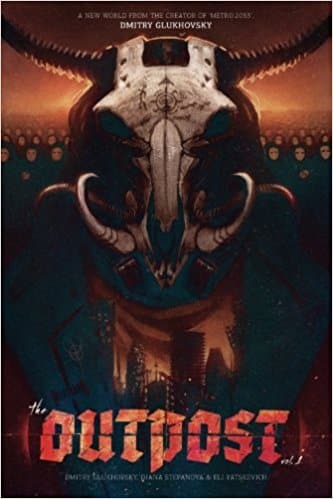
As do most social critics, Glukhovsky does not confine his social commentary to his own society, but rather tends to see all societies as flawed. He has allowed his Metro series to be widely developed by across Europe by multiple authors, often with commentary made on their own social problems. Glukhovsky himself wrote a graphic novel based on Metro but set in America. There, in The Outpost, we find survivors living in heavily fortified cities, fearing both traitors rumored to have infiltrated them and invasions from “dark,” heavily tribal-looking people from the outside. The heroine is dreaming of a better life she is sure exists somewhere else, but is trapped within the walls of her current home. Thus, we can also see a liberal critique of America – with familiar themes of militarism, racism, and social immobility. The effort, however, was one of his least successful, with the VK page garnering only about four thousand followers and most reviewers commenting on the book’s brevity and lack of depth. A follow-up to the book, which was to be set in Korea, has been put on hold.
Today, Glukhovsky continues to write fictional novels as well as political articles for Harper’s Bazaar, l’Officiel, GQ, and Playboy. His continued effort to explore social and political structures is, he says, not to accumulate money but to “recruit readers to his humanistic cause.” This cause is to combat state owned television, and media, with free literature that writes against the grain. For him, his novels and articles are meant to be read as political statements that will either start a “conversation or a duel” with the reader. He also continues to draw on long-standing inspirations in Russian literature but also to tirelessly innovate and experiment with form.
By publishing his works online, for free, he can more easily spread his opinions with a larger audience than traditional print publications could reach. Like writers in the Soviet Union, Glukhovsky also continues to create science fiction as a means to address the issues he sees in society and as his literature continues to spread virally, he is growing more comfortable writing about the problems he sees directly rather than hiding them in symbolism and satire.


